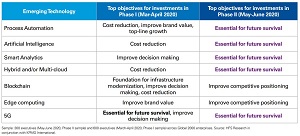News
Report: Emerging Tech Key as COVID-19 Shifts Business Priorities to 'Survival'
Emerging technologies are key to organizations that have seen their business priorities switch to "survival" amid the COVID-19 pandemic, says a new report.
Titled "Enterprise reboot," the survey-based report comes from KPMG International and HFS Research. It states that more than half of surveyed executives indicated the pandemic significantly impacted strategic business priorities. What's more, amid shutdowns, "The number one aim of emerging technology investments for nearly all companies surveyed is future survival."
Those emerging technologies include:
- Cloud
- Automation
- Analytics
- Artificial intelligence
- Blockchain
- 5G
- Low-code software
The survey research was conducted March-June of this year.
"Since the pandemic began, emerging technologies all along the spectrum have been embraced out of necessity," the report said. "As a result of COVID-19, more companies are leveraging technology to make immediate operational changes (such as enabling remote work, diversifying the portfolio, expanding delivery, and automating processes) than to drive new growth (such as pursuing acquisitions). Meanwhile, as the pandemic has progressed, making the business case has emerged as the primary challenge to realizing value from emerging technologies."
 [Click on image for larger view.] Investment objectives narrowed during COVID-19: The focus is now on future survival.
(source: KPMG International and HFS Research).
[Click on image for larger view.] Investment objectives narrowed during COVID-19: The focus is now on future survival.
(source: KPMG International and HFS Research).
Other highlights of the report include:
- Business priorities have shifted overnight: 57 percent of executives say COVID-19 has significantly changed their organization's strategic priorities.
- Spending cuts for enabling technologies are likely short term: Executives expect to increase spending across nearly all technology areas in the next 12 months.
- The power of AND is greater than the power of OR: 64 percent of executives believe that the combined use of emerging technologies is much more beneficial than using any of the technologies in isolation.
- With higher investments come more realized value: More than 80 percent of companies are investing or planning to invest in emerging technologies.
- Crisis is driving clarity in technology investments: 56 percent of executives agree that cloud migration has become an absolute necessity.
Going forward, along with putting survival first, the report said organizations should follow these best practices:
- Prioritize investments: An agile organization focuses on the highest-value actions -- right now. Prior to COVID-19, objectives for emerging technology investments were scattered. Today, there needs to be more focus. The "have to haves" will take precedence. In other words, what is viable, tangible, and has the strongest business case? With a global recession underway, emerging technology projects should be tied to improvements that are measurable.
- Scale change intentionally: It's time to think differently about how to scale change. Companies need to find ways to break down large-scale efforts, like digital transformation, into small, bite-sized chunks. Without a clear view of what might happen in one, six or even 12 months, it is wise to deploy emerging technologies in areas where there is a fairly strong chance of positive outcomes.
- Take a broad view: Given rapid changes in the business environment, the enterprise's ability to quickly implement platforms for ongoing digital transformation is the real market differentiator. Businesses can't look at emerging technology in a vacuum. A narrow approach won't drive meaningful change or achieve the resilience needed for success in the new environment. Rather, combining technologies together is the key to enabling game-changing solutions.
- Integrate IT: The boundaries between IT functions and the rest of the business were blurring even before COVID-19, as digitization and automation moved into the front, middle, and back offices. Now, organizations have to integrate technology into organizational structure and strategy consciously. Doing so will help overcome top challenges to emerging technology adoption, which center on culture, risk appetite, talent, commitment, data, and the business case -- not the technology itself.
- Leverage data as an asset: Data will continue to be a critical decision-making tool. It can't be an afterthought. Superheroes recognize that data has value and manage it as carefully as other corporate assets. Organizations should develop and continue to optimize internal policies and principles for the collection, management, and use of data in order to embed data insights into core business operations and increase trust in emerging-technology implementations.
- Make trust the foundation: Institutional trust is essential for agility, transformation, and resilience, but it was already eroding prior to COVID-19. Trust is even more critical now that organizations have to manage several challenges at the same time. Recovering trust is paramount to joining the ranks of emerging technology Superheroes. Organizations that established sophisticated trust infrastructures capable of responding dynamically were the ones thriving before COVID-19 and are in better positions to recover.
- Adapt the organization: Superheroes know that organizational changes are required to make any transformation work, especially the complex transformations enterprises are pursuing today. Combining emerging technologies to drive business value is harder to achieve than isolated deployments of single technologies. Investing in business and organizational expertise alongside technical expertise, and governing the transformation itself, are required to guide organizations to success.
The survey polled 900 business and technology executives at Global 2000 enterprises with more than $1 billion in annual revenue, operating across nine business sectors and nine countries (Australia, Canada, France, Germany, India, Japan, the Netherlands, the U.K, and the U.S.).
About the Author
David Ramel is an editor and writer at Converge 360.